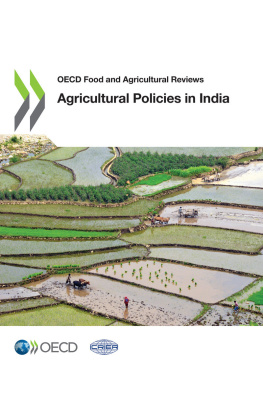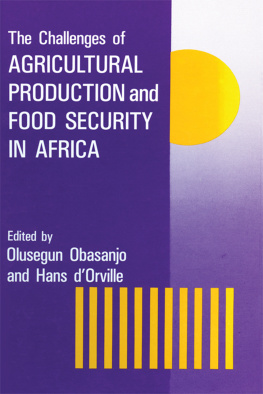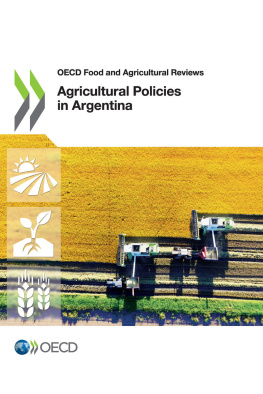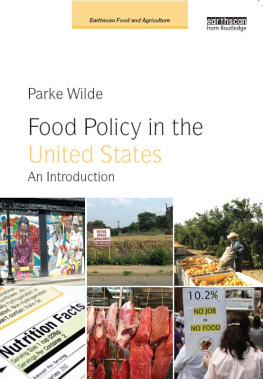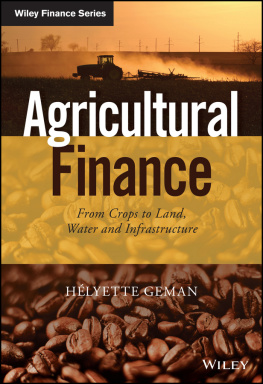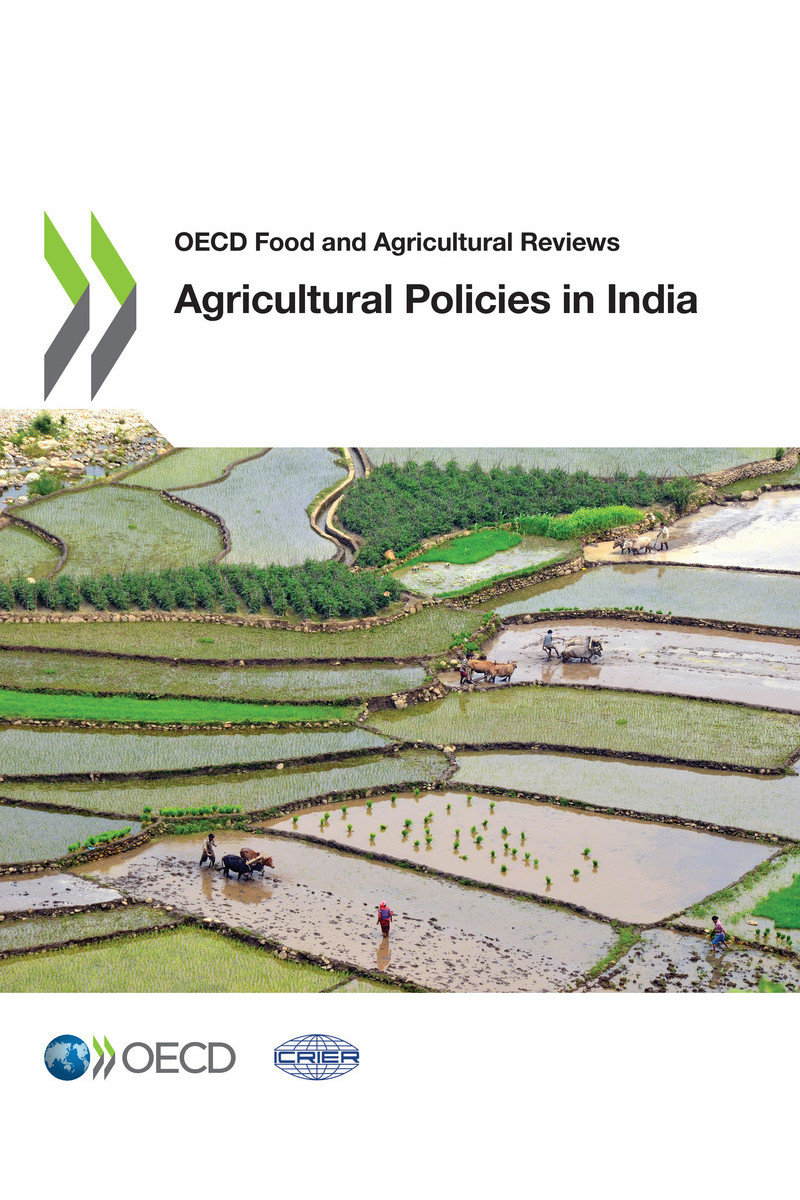Metadata, Legal and Rights
ISBN: 978-92-64-30232-7 (print) - 978-92-64-30233-4 (pdf) - 978-92-64-30337-9 (HTML) - 978-92-64-30336-2 (epub)
DOI: https://doi.org/10.1787/9789264302334-en
Series: OECD Food and Agricultural Reviews
ISSN: 2411-426X (print) - 2411-4278 (online)
This work is published under the responsibility of the Secretary-General of the OECD. The opinions expressed and arguments employed herein do not necessarily reflect the official views of OECD member countries or of the ICRIER.
This document, as well as any data and any map included herein, are without prejudice to the status of or sovereignty over any territory, to the delimitation of international frontiers and boundaries and to the name of any territory, city or area.
The statistical data for Israel are supplied by and under the responsibility of the relevant Israeli authorities. The use of such data by the OECD is without prejudice to the status of the Golan Heights, East Jerusalem and Israeli settlements in the West Bank under the terms of international law.
Photo credits: Cover kikisora / Adobe Stock.
Corrigenda to OECD publications may be found on line at: www.oecd.org/publishing/corrigenda .
OECD/ICRIER 2018
You can copy, download or print OECD content for your own use, and you can include excerpts from OECD publications, databases and multimedia products in your own documents, presentations, blogs, websites and teaching materials, provided that suitable acknowledgement of OECD as source and copyright owner is given. All requests for public or commercial use and translation rights should be submitted to .
Foreword
This review of Agricultural Policies in India is one of a series of reviews of national agricultural policies undertaken by the OECDs Committee for Agriculture (CoAg). The study has been carried out by the Trade and Agriculture Directorate (TAD) of the OECD jointly with the Indian Council for Research on International Economic Relations (ICRIER). It examines the agricultural policy context and the main trends in Indian agriculture. The Review also classifies and measures the support provided to agriculture using the same method the OECD employs to monitor agricultural policies in OECD countries and a growing number of non-member economies, such as Brazil, China, Colombia, Costa Rica, Indonesia, Kazakhstan, the Philippines, Russia, South Africa, Ukraine and Viet Nam. Finally, the study includes a special chapter on the food security policy instruments used in India, with a particular attention to the Targeted Public Distribution System (TPDS). The review is the first stage in a process whereby India will be included in the annual OECD publication Agricultural Policy Monitoring and Evaluation .
The study was jointly led by Carmel Cahill (Trade and Agriculture Directorate, OECD) and Ashok Gulati (ICRIER). Members of the team who contributed immensely and prepared the final report are Florence Bossard, Annelies Deuss, Jared Greenville, Silvia Sorescu (Trade and Agriculture Directorate, OECD), Shweta Saini, Anwarul Hoda, Prerna Terway (ICRIER), and Lars Brink (consultant). Marcel Adenuer (Trade and Agriculture Directorate, OECD) and Marta Kozicka (consultant) contributed to the thematic chapter on food security. Anita Lari, Jennifer Griffin (Trade and Agriculture Directorate, OECD) and Rahul Arora (ICRIER) provided administrative and secretarial assistance. Anita Lari and Michle Patterson (Trade and Agriculture Directorate, OECD) provided publication support.
Earlier drafts of this report benefited from comments provided by Ken Ash, Julia Nielson, Jonathan Brooks, Franck Jsus, Guillaume Grure, Laura Munro, Andrzej Kwieciski, and Streisanne Suter (all from the Trade and Agriculture Directorate, OECD). The database for Producer Support Estimates (PSEs) as well as the associated analytical work benefited from extensive discussions within the Trade and Agriculture Directorates PSE Advisory Group and technical support was provided by Karine Souvanheuane (Trade and Agriculture Directorate, OECD). The report also benefited from key inputs for the research based on discussions with the Directorate of Economics and Statistics (DES), Ministry of Agriculture and Farmers Welfare, and especially Battu Lal Meena (Additional Economic Advisor, DES), as well as discussions with Madhusmita Patra (Secretary General, Indian Railways Conference Association, New Delhi), Manoj Kumar (Online Cargo), and Sumit Gupta (Adani Agri Logistics Limited). Sameedh Sharma also provided exceptional support to ICRIER on the data collection. The study benefited immensely from discussions with traders in Azadpur and Keshopur Mandis in Delhi.
The first complete draft of this document was discussed in October 2017 together with Indian officials and experts during a roundtable meeting at ICRIER headquarters in New Delhi. Inputs received from Shobhana K. Pattanayak (Union Secretary, Department of Agriculture, Ministry of Agriculture and Farmers Welfare), Siraj Hussain (Former Union Secretary, Department of Agriculture, Ministry of Agriculture and Farmers Welfare), Pravesh Sharma (Former Principal Secretary Agriculture, Madhya Pradesh) and Hanish Yadav (OSD to Minister of Commerce and Industry) during the event were valuable. The study also benefited greatly from written comments provided by the Ministry of Agriculture and Farmers Welfare and from discussions with Arvind Subramanian (Chief Economic Adviser to the Government of India) and T Nandakumar (Former Union Secretary, Department of Agriculture, Ministry of Agriculture and Farmers Welfare).
The study was made possible through voluntary contributions from Australia, Canada, the Netherlands, and the United States. It was discussed within the OECDs Committee for Agriculture at its 170 th session in May 2018. We are grateful to Steve Neff (Foreign Agricultural Service of the United States Department for Agriculture), Carla Boonstra (Ministry of Agriculture, Nature and Food Quality of the Netherlands), and Nobunori Kuga (Permanent Delegation of Japan to the OECD) for serving as lead discussants during the Committee for Agriculture review. The OECD very much appreciates the overall involvement of Indian experts from the initial discussions of the study outline through to the Committee for Agriculture review and final revisions, with the final report remaining the responsibility of the OECD and ICRIER.
Abbreviations
AAY
Antyodaya Anna Yojana (Poorest households category)
ACA
Additional central assistance
ADB
Asian Development Bank
ADWDRS
Agricultural Debt Waiver and Debt Relief Scheme
AGEI
Agricultural Growth Enabling Index
AIC
Agriculture Insurance Company of India Ltd
APEDA
Agricultural and Processed Food Products Export Development Authority
APL
Above the Poverty Line
APLM
Agricultural Produce and Livestock Marketing
APMC
Agricultural Produce Market Committee

